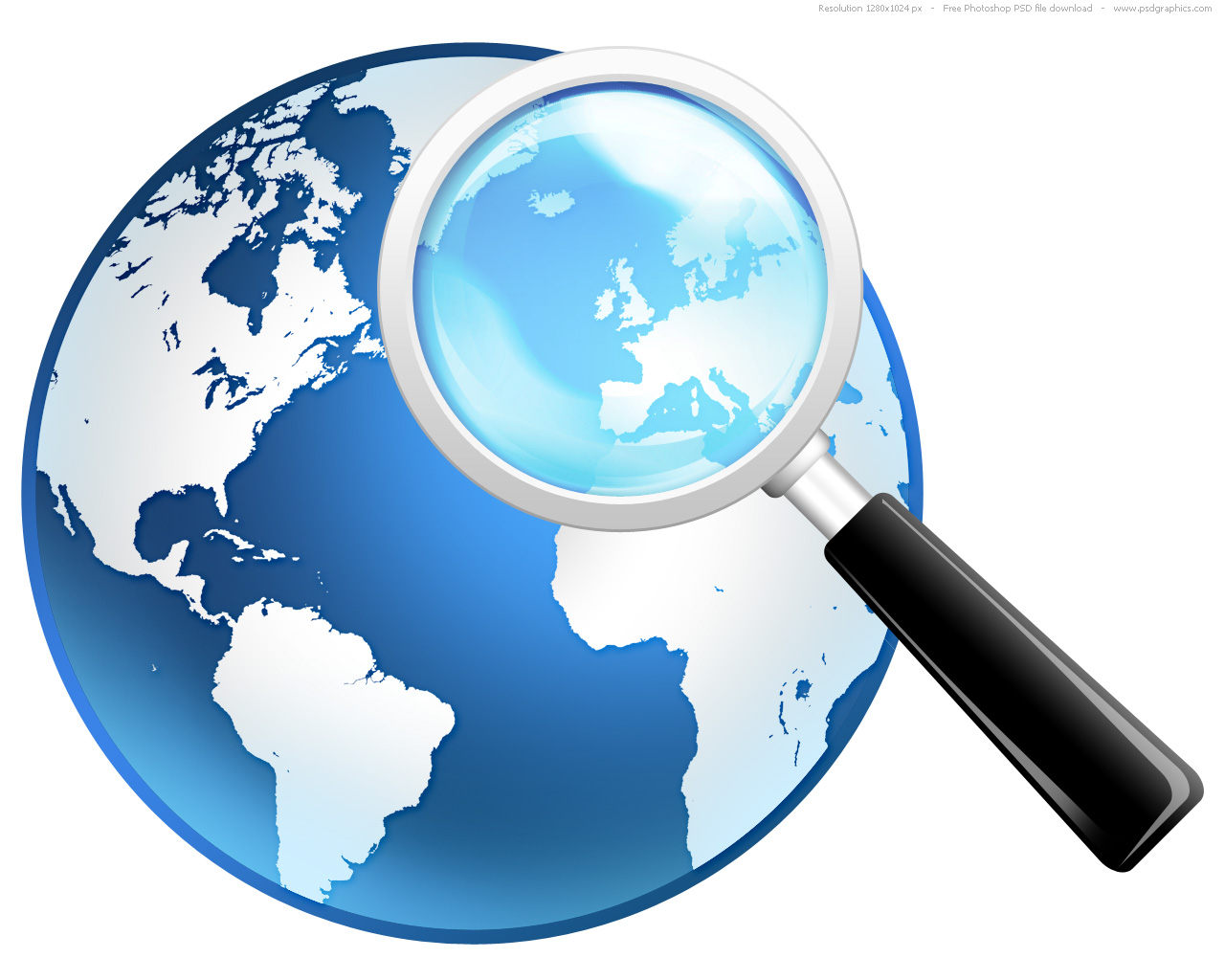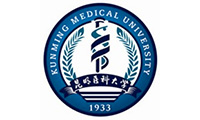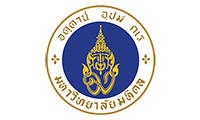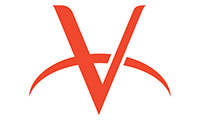Translating evidence/knowledge to inform policy decisions required a systematic, transparent and participatory process. An official platform (e.g., policy workshop or committee) provides an effective forum where evidences meet policy decisions in a transparent and deliberate manner.
The knowledge translation component will identify what policy makers from agricultural and public health sectors in SEA countries need from research synthesis, and how best to package and communicate relevant evidence and findings from ecohealth research to address these needs. We will specifically target middle-level policy makers from relevant ministries (e.g., agriculture, public health), research funders and donors.
The purpose is to synthesize and disseminate research findings to inform policy-making processes – to promote positive changes in policy and practice with respect to agricultural intensification, ecosystems and health. In addition, this will contribute to shaping the future research agenda byidentifying the current state of knowledge and highlighting possible gaps to be filled by research. The capacity of policy makers as well as researchers will be strengthened in linking research to policy in the future.
Objectives
The component has two major objectives:
- To promote linkages between the research and policy communities by establishing and cultivating relationships, especially among senior researchers and middle-level policy makers
- To build their capacity to translate research evidence to inform and influence policy decisions
Methods and steps
The knowledge translation process and dynamics are depicted in the following diagram:
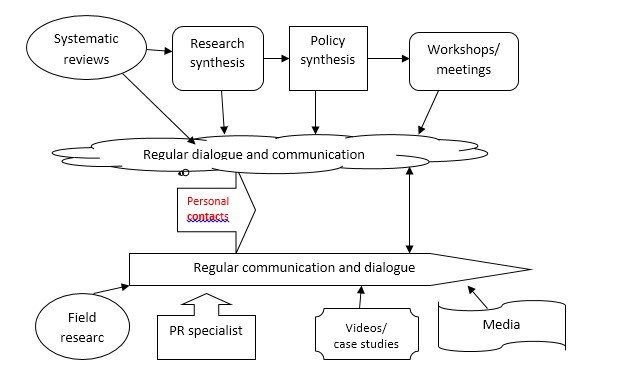
Map policy actors and form policy alliance groups
The first step is to map key actors and stakeholders in the policy arena. We will use the stakeholder analysis approach to systematically identify key individuals and organizations that are influential in the field of agricultural intensification related to health. Based on APEIR and collaborating networks as well as internet-based research, we will identify relevant senior researchers and middle-level policy makers, as well as key staff of research funding agencies. The characteristics and behaviors of these actors as well as current ecohealth-related policies will be analyzed. This will serve as a baseline for evaluating the outcomes of this component by the end of the FBLI program
This mapping exercise will lead to the formation of policy alliance groups in China, Indonesia, Thailand and Vietnam. These informal groups will bring together senior researchers and middle-level policy makers currently active in work related to ecohealth and agricultural intensification. It is anticipated that some of the colleagues involved with the country research teams will be tapped to join the groups. To keep the size of these groups manageable, a maximum of 10 members – half from research and half from the policy side – will be engaged in each country. These policy alliance groups will be the core vehicle for the entire knowledge translation component, guiding and participating in a range of key activities throughout the five-year period.
Conduct systematic reviews
Reviews will be conducted in the four countries to identify and assemble the main ecohealth research findings, and synthesize findings and implications for changes in policy and practice. These reviews will be done in close collaboration with the country research teams. In addition, we will invite selected APEIR senior researchers and members from other networks in the region to take part in the reviews. National teams will be contracted to carry out this work, which will be guided by a Terms of References, including a framework for the synthesis, as well as criteria for determining which studies should be considered for inclusion in the reviews.
Identify the most important themes for synthesis
The policy alliance groups will identify two or three key themes for synthesizing, in the area of agricultural intensification relevant to the health of ecosystems and humans, and aligned with the priorities emerging from the research component. It will be important to consult with senior policy makers in order to understand about what they want in term of research evidence to support policy making. Methods for doing this will include: expert consultancies to solicit ideas from senior policy makers; brainstorming exercises with policy makers and senior researchers to articulate needs and recommendations; and inviting experts to contribute their ideas regarding what needs to be synthesized to be used for policy recommendations. These methods will ensure that the research synthesis topics will be based on the actual needs of the end-users (policy makers and practitioners), and will link closely with the topics being investigated by the country research teams.
Produce synthesis products and recommendations
These products will be targeted toward policy makers, and focus on delivering key messages and recommendations through policy briefs that synthesize research findings on the above-mentioned themes. Synthesis products will include concise publications in both English and in national languages, with a view to improve the accessibility of major findings and key messages for senior policy makers who have little time to examine lengthy research findings.
The involvement of APEIR senior members is extremely important for developing and mentoring knowledge translation streams. Selected members will be invited to participate in several processes, including: consulting with stakeholders to discuss policy gaps; reviewing synthesis products to ensure the relevance and clarity of key messages; and liaising with national policy makers to share and discuss research findings and policy recommendations.
Produce participatory video case studies
A multidisciplinary team from six countries in the Mekong region will take part in a unique learning process: a “participatory video documentary” on ecosystems, human health and global change that begins from the heart of the Tibetan Plateau and traverses the Asian landscape to the Mekong delta. The documentary team will select up to 8 case studies from the Tibetan Plateau, Yunnan highlands, Golden Triangle of Myanmar, Laos and Thailand, Tonle Sap Lakes of Cambodia, and Mekong delta areas of Vietnam. For each case study, the documentary team will interact with local villagers as ecohealth practitioners to learn how changes in the greater Mekong ecosystem impact human health. The documentary will be evidence-based and draw from published scientific papers or local reports. The final produce will be presented during the Kunming Ecohealth Forum in 2012.
Policy communication and dialogue
This is an ongoing process, consisting of the following activities:
Policy workshops and seminars. A series of regional and national policy workshops and seminars will beorganized for research partners and policy makers to help them identify issues and develop effective solutions based on research findings. Research partners, policy makers and media will be invited to participate in these knowledge dissemination events, which will actively seek the collaboration of other partners. Another approach will be to organize side events at major policy meetings events as a means for further sharing research results. APEIR senior members will be invited to facilitate some of these workshops and seminars.
Media events. Opportunities for knowledge dissemination though various media channels and resources will be fully explored with regard to newspapers, radio, TV and the Internet. Media coverage will help convey key messages to policy makers and the general public. A popular channel may be the roundtable talk show, where researchers can present their key findings and policy makers can share their reactions and views.For example, an APEIR research team member and FBLI future leaders coordinator (Dr. Wiku Adisasmito) has successfully applied this approach in Indonesia.
Public relations specialist. Public relations expertise will be needed to help prepare communication plans, develop key relationships with national and regional media, and support national teams in developing content for websites and other communication materials. Social media such as YouTube, Facebook and Twitter will be utilized as channels for disseminating synthesis products
Expected outcome
- Strong and enduring linkages among policy makers and researchers have been established, enabling the effective uptake and use of research findings and evidence in policy formulation and implementation.

